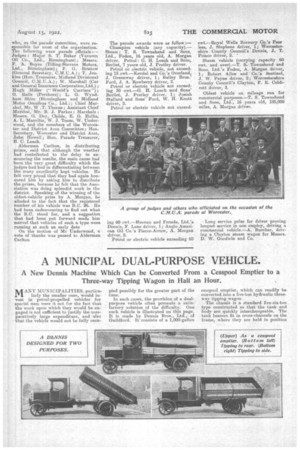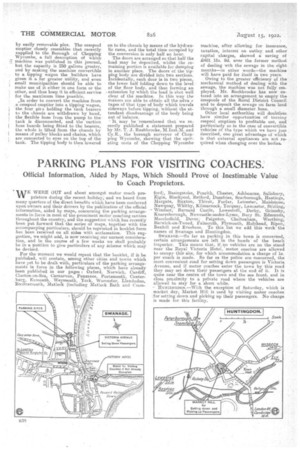A MUNICIPAL DUAL-PURPOSE VEHICLE.
Page 19

Page 20

If you've noticed an error in this article please click here to report it so we can fix it.
A New Dennis Machine Which Can be Converted From a Cesspool Emptier to a Three-way Tipping Wagon in Half an Hour.
MANY MUNICIPALITIES, particularly the smaller ones, would invest in petrol-propelled vehicles for special uses were it. not for the fact that the work upon which they would be engaged is not sufficient to justify the cOraparatively large expenditure, and also that the vehicle would not be fully occu
pied possibly for the greater part of the time.
In such cases, the provision of a dualpurpose vehicle often presents a satisfactory solution of the difficulty. One such vehicle is illustrated on this page. It is made by Dennis Bros.' Ltd., of Guildford. It consists of a 1,000-gallon
cesspool emptier, which can readily he converted into a five-too hydraulic threeway tipping wagon The chassis is a standard five-six-ton type constructed so that the 6nk and body are quickly interchangeable. The tank bearers fit in cross-channels on the frame, where they are held in position by easily removable pins. The cesspool emptier closely resembles that recently supplied to the Borough of Chepping Wycombe, a full description of which F. machine was published in this journal, but the capacity is 250 gallons greater, and by making fhe machine convertible , to a tipping wagon the builders have . given it a far greater utility, and even small municipalities should be able to make use of it either in one form or the other, and thus keep it in efficient service for the maximum time possible.
In order to convert the machine from • a cesspool emptier into a tipping wagon, the four pirs holding the tank bearers to the chassis are withdrawn by hand, • the flexible hose from the pump to the tank is disconnected, and the suction hose boards being fitted to the bearers, the whole is lifted from the chassis by means ,}f pulley blocks and chains, which are connected to eyes on the top of the tank. The tipping body is then lowered on to the chassis by means of theldranlie rams, and the total tithe occupied by the conversion is only half an hour. The doors are arranged so that half the load may be deposited, whilst the remaining portion is available for duMping in another place. The doors of the tipping body are divided into two sections. Incidentally, each door is in two pieces, the lower half folding down to the level of the floor body, and thus forming an 'extension by which the load is shot well clear of the machine. In this way the makers are able to obtain all the adva tages of that type of body which travels sideways before tipping. without the attendant disadvantage of the body being out of balance.
' It may be 'remembered that we recently published a statement prepared by Mr. T. J. Rushbrooke, M.Inst.M. and Cy.E., the borough surveyor of Chepping Wycombe, showing that the operating costs of the Chapping Wycombe machine, after allowing for insurance, taxation, interest on outlay and other capital charges, showed a saving of £481 18s. 9d. over the former method of dealing wth the sewage in the eight months—in other words—the machine will have paid for itself in two years.
Owing to the greater efficiency of the mechanical method of dealing with the sewage, the machine was not fully employed. Mr. Rushbrooke has now entered into an arrangement to empty the cesspools of the Rural District Council and to deposit the sewage on farm land through a small diameter hose.
Other local authorities will doubtless have similar opportunities of turning cespool emptiers to profitable use, and particularly so in the case of convertible vehicles of the type which we have just described, one great advantage of which is that external appliances are not required when changing over the bodies.




























